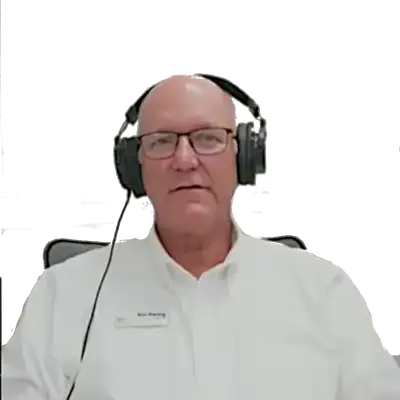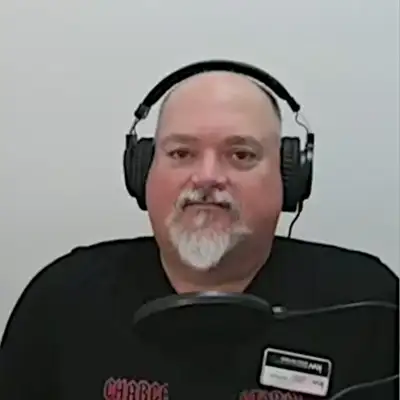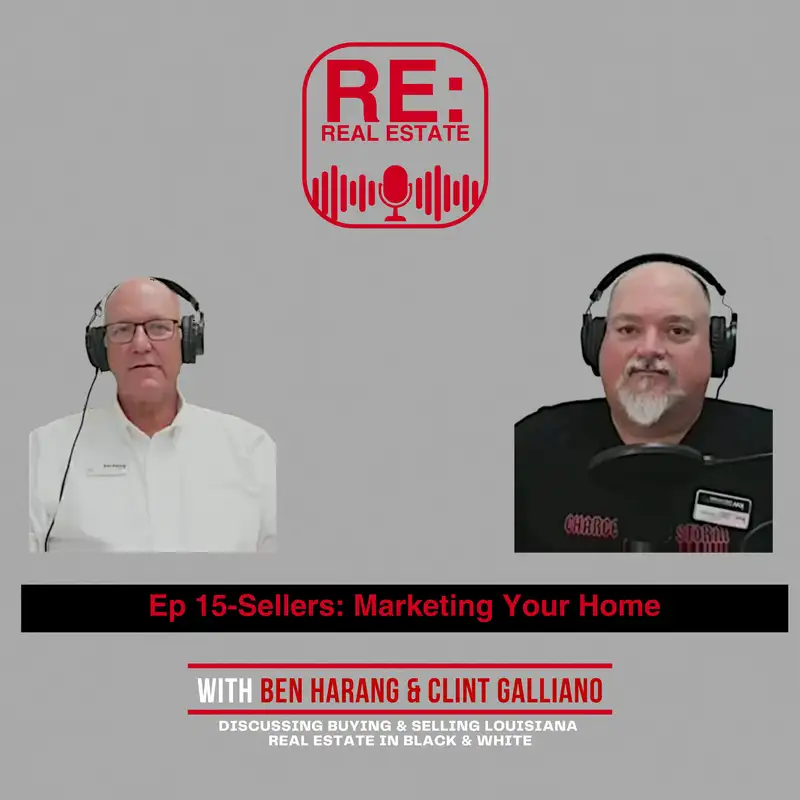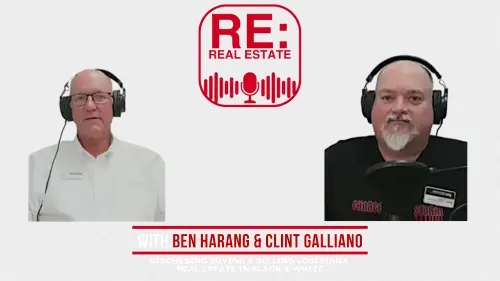Sellers: Marketing Your Home
Clint C. Galliano (00:28)
How you doing, Ben?
Ben Harang (00:29)
Hey Clint, afternoon. I'm doing terrific. How you doing, man?
Clint C. Galliano (00:33)
I'm doing wonderful.
Ben Harang (00:35)
Good, good. Had a little cold front come through last night. Winds howling out there this morning. So if you hear some wind blowing in the background, that's just Mother Nature talking to us on Ash Wednesday, the day after Mardi Gras.
Clint C. Galliano (00:52)
Yeah, was a nice comfortable surprise when I walked out the door this morning.
Ben Harang (00:59)
it was nice to turn around and get a light jacket. I wasn't expecting that. So it's refreshing.
So what we're talking about today, Clint.
Clint C. Galliano (01:12)
All right, so now that we're into our seller series, today we're going to talk about marketing a home for sale.
So why don't you tell us a little bit about that, Ben?
Ben Harang (01:24)
Okay. Most of what we do as agents is marketing, whether we're marketing a property or ourselves. When we list a house, couple of the things we do, you got to be aware of, we do things like put the sign out in front of the house, put the yard sign out. We enter the information into our multiple listing system, our MLS, which is then replicated.
across the internet based on that one input. So all of the other, pick a website. That's where the information comes from. It comes from our MLS. An advantage we have as an agent over somebody trying to sell their own house is we're in the market day in and day out. We have clients that are in the market. Other agents have.
clients that are in the market and I view my job as multi-pronged. One of the things we need to do is make the world realize your house is for sale and we need to make sure the agents, the other agents in the Bayou Board of Realtors or New Orleans or Baton Rouge or Lafayette or wherever they may be know your house is available. So if they have a client that is interested in a house similar to yours
They'll be notified and the process starts with the other agent and the buyer's talk and they plan a strategy and they come up with a game plan and actually make an appointment to go see your house.
Then we also do things like video marketing, open houses to the public, agent open houses to let the other agents see the houses. So most everything we do other than negotiating the deal, which is pretty important, revolves around marketing.
Clint C. Galliano (03:32)
Yeah, excuse me. It's a big thing. Like you said, for sale by owner properties, that's people trying to sell the property by themselves. They have to focus on all of it, letting everybody know it's for sale.
getting people's attention that might be interested in buying it, coordinating showings, scheduling showings, being available for showings, all that fun stuff. On our side, when we're, our goal in marketing a listed property is to get as much attention as possible. Not only do we market to the general public, and like Ben said,
When we put it in the MLS that automatically syndicates to, you could practically say hundreds of different websites across the country and possibly the world, including our own sites to let everybody know that the home is for sale. We prefer if...
if you are listed with us that you share the site or you share the link to the property from our website so that the people interested in buying contact us as opposed to contact one of these other commercial sites that sells the the buyer's information to other agents. That's just a personal preference.
But ultimately, we try to position your property compared to the other available properties on the market and promote it and generate interest in it. And, you know, it could be from videos. The main thing, it'll be photography, social media advertising, flyers, signs.
could be open houses, variety of things, with the main goal of getting interested buyers into the home.
Ben Harang (06:06)
So one of the things that I talk to sellers about, everybody wants to save a dollar, understand, according to the National Association of Realtors, that statistics show that we put 13 % more into the pocket of the sellers if they hire a realtor.
Than if they try to sell it themselves because the first offer you're to get if it's full priced is going to be a x percentage below List price because there's no agent involved. So you're paying for the agent right off the bat You also have the issue a safety issue You know we clint and I do this every day all day And we talk to people we don't know we talk to a lot of people we know but every now and then we we get one that
out of town coming in, it might be little vague on what their purpose is. So we don't want to turn anybody away. We have a database that looks into people's backgrounds and we can ID somebody with a sketchy background. But just because they have a sketchy background doesn't mean they can't buy a house.
But if you're gonna sell your house yourself, what I tell people is please be careful. Don't assume everybody just wants to look at your house because they think they might want to buy it. They have all other reasons why they might want to be looking at your house, none of which are good. The only good thing about looking at your house is if they really want to buy it. So there's a safety factor involved when you have a third party.
involved in the transaction, you're not jeopardizing the safety of you or anybody in your family by trying to sell the house yourself. And you need to decide what that is worth to you.
Clint C. Galliano (08:12)
So along those lines, some of the tips that we recommend when you're getting your house ready, and it can be considered part of the marketing, you want to depersonalize your house. If you've got walls full of pictures of your family growing up, you don't want that when we're doing showings.
A, it makes it harder for the buyers to see themselves in the home because they're looking at your pictures. But again, back to a safety standpoint, you don't want people coming in and for lack of a better term, casing the joint and seeing who your family members are, what they look like and how they can identify and seeing what you have in the home that they could come at a later time.
break in and steal it. Those are all things that you want to be careful of.
Some other things that you want to look at is.
All right, I blanked out again. I'm doing that again, trying to shoot from the hip.
Ben Harang (09:26)
All right. One other thing that,
yeah, that goes along with depersonalizing it is decluttering it. The two big things I recommend is depersonalize it, like Clint said, and declutter it. We walk into some houses and it's clean as a whistle. You can eat a fried egg off of the floor, but there's not a square inch of counter space.
Available for anything in the house because they have "dree-guy" all over the place knickknacks If you're move you need to move all of that stuff anyway, so move it now get some boxes Clear as much of the counter space as you can to show how much counter space you have not to exaggerate it But you don't want to limit what people see when they go see the house You want to show them what the house has if it has a lot of counter space great if it has
A little counter space, all the more important to clear it out and just leave out on the counter, which you actually use on a day-to-day basis. Some people might use a toaster every morning for breakfast. It's not that difficult to pick the toaster up and put it away before you leave in the morning. the cleaner the countertops are, the sparsely populated they are, the better the house is going to show.
Clint C. Galliano (10:53)
And to add onto that, you also should consider cleaning out the bottoms of your closets. Lots of houses that I show have the closets full that it almost seems like the contents are going to pour out like a waterfall when you open the doors.
Ben Harang (11:11)
you
Clint C. Galliano (11:12)
if you clean out the floor of the closet at minimum. You can have stuff stacked on shelves. You can have clothes hanging in the closet, things like that. But having the floor clean, that makes the closet seem bigger. It makes the room seem bigger. It makes it more appealing to buyers. That's kind of like a second option if you're still occupying the home as opposed to just clearing out the closet completely.
Ben Harang (11:42)
Another thought about going along with the declutter and depersonalize is I referred to it like a race, a race car, a race horse or something. There's pressure to get the race started. You want to get the house on the market. You want to get going. You want to get it sold. And I tend to say, well, hang on a second. Let's get the house ready because we only have
one chance to make a good first impression. I want the house as ready for the market as it will be. We can't paint it the weekend after we list it. Let's paint it the Monday after you paint it that weekend. So we don't want people to see any more flaws than are obvious in the house and that you disclose, but we want to get it as market ready as we can before we put the for sale sign on.
in and turn it live in the MLS because once we turn it live in the MLS and another site picks it up and then we go make a change that third party site may or may not pick up the change so if we if we do new photos after a paint job the some sites may still have the old photos of your house that needs paint so just we want to get it as market ready as possible now
We go push and push and push until you say that's enough. And when you say that's enough, that's as good as it's going to get. Let's put it on the market. but it's, it's wild that every now and then I run into somebody that says, give me a list of what I need to do to my house. I give them a list and I stay in touch for the next month. And the next month they check in, they check in that list off. And when we get that house on the market, it's like we're opening the front door to paradise. Everything that was.
The knickknacks that you always think about, well, I'm going to get to that one day. I'm going get to it one day and never do. I tell people the time to get your house on the market is when you wonder why you're selling it after you did everything you do to it. it's like, well, have a pretty nice house. I think I might stay. That's when the house is ready to go on the market.
Clint C. Galliano (14:05)
Yeah, I've heard that phrase stated a couple of times. You know, it's like, huh, I did all of this and this is appealing.
Ben Harang (14:15)
Right? I might change my mind. And if you change your mind, that's good, you know, but chances are you're not because you're selling it for a reason. It's too small, too big. You're moving up, moving down, moving out. Um, there's all kinds of reasons why you, why you want to sell it. But when you have that, that thought, Hmm, house is pretty nice. I think I'm, I think I want to stay, but then reality sets in and you can't for whatever reason. So, uh, that's where we want to be when, when we get the house on the market.
Clint C. Galliano (14:44)
And we're talking about this as part of marketing when you're going to sell your home because this is part of the marketing. Part of the marketing of your house is how it looks. If it's in need of repairs, it's hard to market against that. It's hard to generate interest because there's a lot of people that don't want to do anything to a house when they move in. They want it move in ready with no repairs needed.
Ben Harang (15:12)
They want
to move there.
Clint C. Galliano (15:12)
that just closed
last week with some clients that they've moved three or four times because the husband was in the military. And they were just so relieved and relaxed that the house they moved into was in perfect shape. There was nothing that needed to be done. All they did was unload the truck, put the beds up, put the living room furniture in, and they were done.
And they said, this is the easiest, smoothest move-in we've ever done. And they were so elated about that. And that's what buyers are looking for. So if you're thinking, well, maybe I'm not going to do this, or maybe I'm not going to do that, imagine that it's not your house. And you walk in and look at your house as if you were a buyer contemplating buying that house.
Ben Harang (15:46)
uh-huh so I have
Mm-hmm.
Clint C. Galliano (16:09)
and then decide would I buy it in this condition.
Ben Harang (16:13)
Another thing I tell people is over time I've come to understand that the thing that will kill a house faster than anything is dead floors. The type of floor really doesn't matter.
But if you have carpet and it's worn, if you have brick and it's as gouge marks, not bricks, wood, is gouge marks and scrapes and scratches and a vinyl that's torn or just anything, a dead floor will kill interest in a house faster than anything because people walk with their head down. They're looking down when they walk. The first thing they see is the floor. And then if they can get past the floor.
They're going to decide, you know, I think I want brand new wood floors throughout the house. We're to put $25,000 worth of wood floor. So you get an offer for $25,000 less than they would pay because the floors are dead. Whereas if you change the carpet, if you repair the wood or change the tile, if it's new and fresh and a buyer doesn't like it, then they will in all likelihood.
decide, you know, the floor is nice. I don't like it. I'm going to change that after I buy it. So they're not going to negotiate the price because you have nice clean floors that they happen not to like. They understand that's on them. So that's just, you know, it is more to it than just putting a paint a coat on one wall in one room and call it a wrap to get your house ready for the market. People will say, well, Johnny and Susie sold a house down the street.
In three days for $30,000 more than you tell him, my house is worth. said, did you see Johnny and Susie's house? Let's pull it up. Let's look at the pictures and how does your house compare to Johnny and Susie's house? Who prepped their house, who spent four to six weeks getting it ready. exactly what we talking about. They sprung forward when the house went on the market and the buyers, the active buyers see as many houses as we see.
So they see in all these houses that need renovations or repairs and they walk into Susie and Johnny's house and they see a house that doesn't need any repairs. So I'm not going anywhere until I have a contract on this house. We stand right here and we write the contract. And that does happen.
Clint C. Galliano (18:45)
sure does.
Ben Harang (18:47)
So it's a collaboration on the seller and us as agents to get together to make it work. We can't work magic. We good at what we do, we can market it, but the better product we have to market, the more money you're get for it and the faster it's gonna turn over and close. So you can move on with your life and go do whatever it is that's causing you to sell your house.
Clint C. Galliano (19:19)
And there's other minor things based on the what, the where, the why that we can do. But that's the basics of marketing. It's getting your house ready and what we do with it.
You got anything else to add, Ben?
Ben Harang (19:42)
I think we covered it. I got a little fired up about that, I guess, but it works. It works. And it's frustrating when people say, well, I'm let the sellers (not sellers, buyers) do that after. I'll give them a $2,000 credit for a $20,000 repair or something. It doesn't work. And I've been proven wrong. I've told people the value of their house. And they went in.
And we talked about what needed to be done and they had a ton of work needed to be done. thinking of one in particular. And these people spent three months getting this house ready. And I told the wife, said, know, if anybody can do this, you can. Because I'd seen some work she had done before in staging and stuff. And they got this house ready. It was a...
an older house in a desirable neighborhood. And it took a little while, but I think it was about six weeks. We had a buyer full price on that house. And when he closed, I looked at him and said, I never saw this one coming. So it does work. And I think we said that enough. So one other thing I don't think we said.
Clint C. Galliano (21:00)
Yeah
Ben Harang (21:06)
When we list your house, we sell it. We have an inventory of houses to sell. Other agents can sell it. And there's about 400 of us just in the body board of realtors that have it available to them to sell. Whereas people that have that try to sell their house, the for sale by owner, they have one house to sell. that's it. If people don't like your one house, you spend all that time really for nothing.
wasted your time. Whereas if we have somebody and they see another house they think they like, we go look at it and we start talking, we bring up your house. It might not be on their radar, we might talk about it, we end up a last minute showing on your house and it fits them perfectly. So that's another reason why the system works and we can get things closed.
Clint C. Galliano (22:02)
Yeah, or to state it in another way between us at our brokerage and all the other brokerages in the Bayou Board and all the other brokerages that have access to the Bayou Board, there's way more than 400 something agents that may have buyers that want to buy in the area.
So it's a lot bigger buyer pool than just what people can see on Zillow and Facebook. You know, and we get that out to them. We reach out to them. We specifically target them. We've got internal systems that let them know that we've got it for sale and that it matches their buyer's criteria.
Ben Harang (22:38)
Yeah.
Clint C. Galliano (22:57)
And so those are the tools that we have that we use day in and day out to get your home sold.
Ben Harang (23:05)
And
one more thing about the multiple listing service, whether you're in Homa, Thibodeau, New Orleans, Baton Rouge, Alexandria, Monroe, pretty much all the South, Lake Charles and Lafayette, I think are still struggling with it, but we all belong to basically the same MLS. And regardless of who has it listed, if they have a house listed on Edgewood in Thibodaux
somebody in Alexandria or Monroe could have it listed. The details are there. So we, like Clint said, when I said 400, I was talking about the Bayou board, but we have something we call ROAM now, which is a conglomerate of the different boards of realtors around the state. I think there's nine of them and maybe six of them are involved in ROAM
So regardless of who lists it, it's available. We're all in the same system. So theoretically, somebody from Monroe could come down and sell your house. Might not be a good idea for the buyer, but it's their choice.
Clint C. Galliano (24:14)
Well, and as an example of that, I'm in the process of buying a townhouse in Natchitoches, four hours away from myself. You know, and that's in a totally different board of realtors, but we're able to make that happen.
Ben Harang (24:23)
Mm-hmm.
Yeah. So there's all kinds of it. The system just works. Um, I don't know how else to say it other than the ways we've been saying it. So if you, if you thinking you want to sell your house, call me, call Clint, uh, call your favorite realtor, your favorite real estate agent doesn't have to be a realtor, but get somebody else involved with some experience and expertise in the sales process and
According to the National Association of Realtors, you'll have more money in your pocket after the fee is paid.
Clint C. Galliano (25:08)
All right.
All right, so remember to like, share, and subscribe. If you're on YouTube, if you're listening to it on your favorite podcast app or on our website, subscribe on your favorite podcast app and share it with all your friends. Help us make this big.
Ben Harang (25:11)
All right.
We need to put some posted notes up because we both forget to say that. And they say that's how you get it out there. So if you can help us out, that'd be great. If you just want to watch it and just take the information, that's OK too, whatever you want to do. So all right, Clint, I think that's a wrap for the day. What you think?
Clint C. Galliano (25:34)
Yeah.
I think so, Ben, we got it in the can.
Ben Harang (25:52)
All right. Y'all have a great day. Thanks for watching.
Clint C. Galliano (25:56)
See ya.
Creators and Guests



